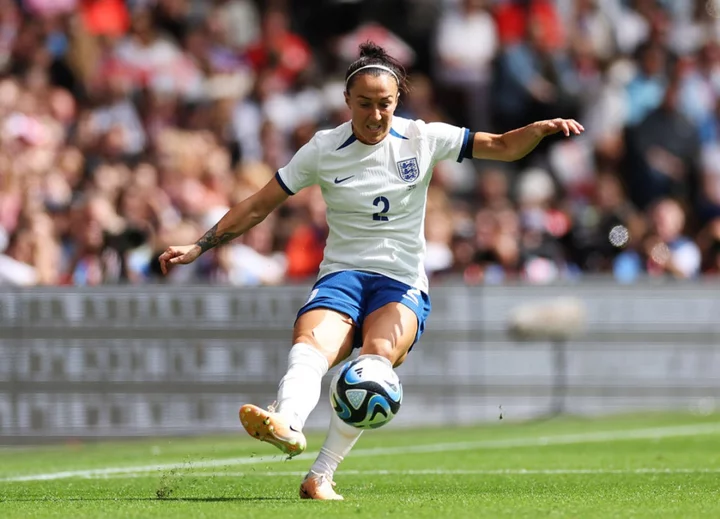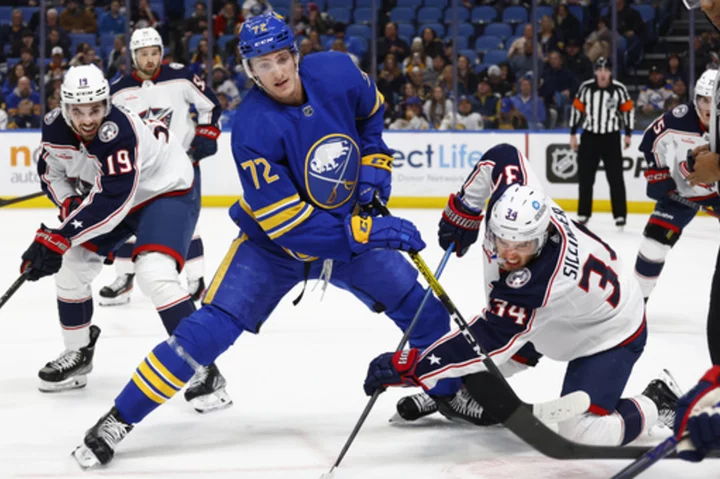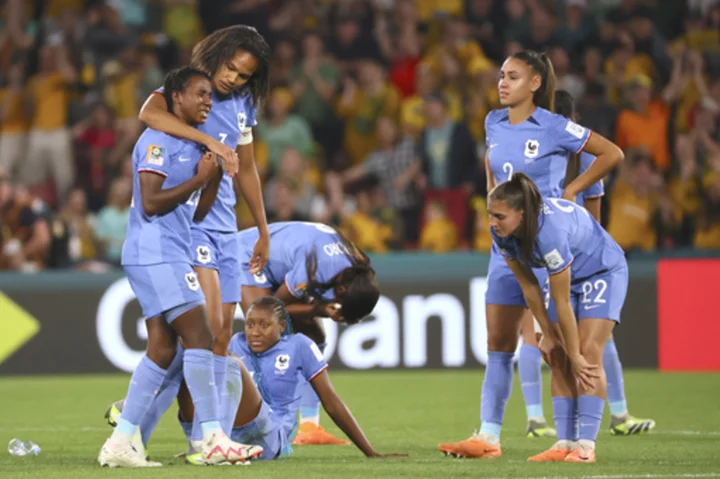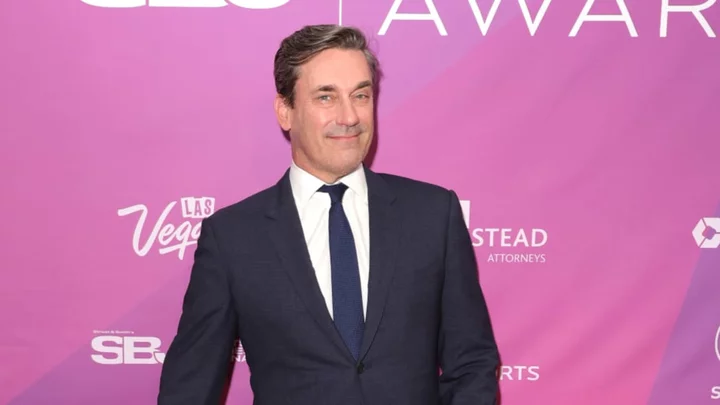The Women’s World Cup is finally here as the biggest tournament ever kicks off in Australia and New Zealand. The first 32-team Women’s World Cup is set to be one of the most open yet, with a host of teams challenging to dethrone the two-time defending champions United States. England head ‘Down Under’ full of belief after their Euros success on home soil last summer, but that is also set to inspire co-hosts Australia and their star forward Sam Kerr. Here’s everything you need to know ahead of the 2023 Women’s World Cup, including group guides, players to watch, and how to follow on TV . Group guides Group A: New Zealand, Norway, Philippines, Switzerland Women’s World Cup history hangs over co-hosts New Zealand Group B: Australia, Republic of Ireland, Nigeria, Canada The inspiration behind Australia’s shot at home World Cup glory Group C: Spain, Costa Rica, Zambia, Japan Can Spain regroup from mutiny to challenge for the Women’s World Cup? Group D: England, Haiti, Denmark, China Who are the threats to the Lionesses at the Women’s World Cup? Group E: United States, Vietnam, Netherlands, Portugal Are the United States still the team to beat at the Women’s World Cup? Group F: France, Jamaica, Brazil, Panama Can France handle injuries after overcoming Women’s World Cup crisis? Group G: Sweden, South Africa, Italy, Argentina Can Sweden turn heartbreak into Women’s World Cup history? Group H: Germany, Morocco, Colombia, South Korea Germany are out for revenge - the World Cup is the perfect chance Players to watch New Zealand: If New Zealand are going to need something special to break their cycle of World Cup disappointment on home soil, don’t be surprised if they are inspired by the fearlessness of youth. The Football Ferns finished an impressive third at the Under-17 World Cup five years ago and striker Gabi Rennie, the team’s No 9, is a breakthrough prospect. Norway: It’s a testament to the skill, speed and elusiveness of Barcelona’s Caroline Graham Hansen that Guro Reiten isn’t even the most dangerous winger on the Norway team. Arguably the best dribbler in the game, the 28-year-old took a break from the international side following the Euros last summer but is now back to best - as Chelsea once again found out in this season’s Champions League. Switzerland: The smooth and composed Lia Walti draws the eye in the centre of midfield and the captain is the pillar of the side. “Lia is such a magnetic player. Everyone passes to her,” said the Switzerland head coach Inka Grings. “She always demands the ball and, when she has it, it sticks to her feet.” Philippines: Sarina Bolden took the most important kick in the history of the Philippines with the winning penalty against Chinese Taipei that secured their qualification for the World Cup. The Philippines will need more moments of history to make an impact in New Zealand. Australia: There’s no question about this. Sam Kerr is the face of the World Cup and the star of the Australia team. As the most lethal striker in the world, who always seems to deliver on the big occasion, the Chelsea forward could be the difference for the Matildas as they look to advance past the quarter-finals for the first time. The 29-year-old makes the hosts a genuine contender. Canada: Christine Sinclair has been setting records for most of her life. At 40, and now into the 22nd year of her international career, the striker is set to become the first player to play at six World Cups - although Brazil’s Marta could later equal that record this tournament. In Australia, Sinclair and Marta also have the chance to become the first player to score at six different World Cups. Nigeria: Asisat Oshoala doesn’t just have a claim to be the greatest African player in the world, but the best of all time. The Nigeria striker and Barcelona star has won the African player of the year award four times and has hit at least 20 goals in each of her last two seasons in Spain. The Super Falcons may have been drawn in the group of death, but Oshoala will be a threat to both Australia and Canada. Ireland: Katie McCabe. The Arsenal fan favourite famously wears her heart on her sleeve and embodies what Ireland will require in Australia: defensive nous, aggression, a lot of effort, and quality when it counts. McCabe has it all and alongside Denise O’Sullivan will be key. Spain: Aitana Bonmati. When an ACL injury robbed two-time Ballon d’Or winner Alexia Putellas of the chance to play at the Euros last summer and then took away almost all of the following season, it handed her international and club team-mate Bonmati the opportunity to play further forward for Barcelona. How she took it. Arguably the best player in the world over the past year. Japan: Yui Hasegawa. Signed by Manchester City last summer to replace England’s Keira Walsh, the 26-year-old impressed with her class and composure on the ball and tenacity in midfield, finishing the season as one of the top performers in the Women’s Super League. Japan will rely on Hasegawa to set their tempo from the middle of the pitch. Zambia: Barbra Banda made history at the 2021 Olympics when she became the first player to score back-to-back hat-tricks at the Games. The 23-year-old is captain of the Zambia side and is key to their chances of making it out of the group, as her stunning two-goal display against Germany before the tournament showed. Costa Rica: Raquel Rodriguez is Costa Rica’s record scorer with 55 goals, including the country’s first at a World Cup on their only previous appearance in 2015. The Portland Thorns midfielder, who has won over 100 caps for Costa Rica, has urged her team-mates to battle with passion and commitment as they look to claim a first-ever World Cup win. England: Keira Walsh was the player of the match in the Euros final and remains England’s most important player with her ability to set the team’s pace and tempo in midfield. Walsh moved to Barcelona last summer for what was said to be a world-record fee and after winning the Champions League on her first season at the club, the 26-year-old has returned to the Lionesses to set higher standards. Denmark: Pernille Harder is one of the top players in the world and will be a familiar face to England fans after three successful seasons spent in the Women’s Super League with Chelsea, who she joined for a world-record fee in 2020. The skillful and tireless attacker leads the line for Denmark, who cannot afford to leave her isolated. One of the game’s most decorated players, Harder will be making her World Cup debut. China: Captain Wang Shanshan is a wonder: a veteran striker with a tendency to score crucial goals, the 33-year-old can also help out defensively by playing at centre-back for the team. Haiti: There is considerable excitement around the 19-year-old Melchie Dumornay, who has signed a pre-contract with European powerhouse Lyon ahead of the new season. The midfielder scored twice as Haiti beat Chile in the inter-continental play-offs to qualify for the World Cup and is regarded as one of the best young players in the world. USA: Alex Morgan, the face of the US team and joint top scorer in France four years ago, is back for her fourth World Cup, arguably better than ever. Since helping the US to back-to-back titles, Morgan has given birth to her first child and at 33 is still scoring regularly in the NWSL. Netherlands: With Vivianne Miedema ruled out with an ACL injury, the Netherlands will turn to a relatively unknown prospect for goals. Fenna Kalma only made her international debut in September but comes into the World Cup having scored 30 goals in just 20 appearances for FC Twente last season. Portugal: Jessica Silva is a baller who belongs on the World Cup stage. The Benfica forward has a tall and languid style but is devastating on the ball and is one of the most skillful attackers in the game. Vietnam: As the only player in the Vietnam squad to play their football outside of the country and in Europe, striker Huynh Nhu will be familiar with some of her Group E rivals. The 32-year-old, who is Vietnam’s record goalscorer, plays for Portuguese side Lank Vilaverdense. France: With Marie-Antoinette Katoto and Delphine Cascarino out of the World Cup due to injury, more emphasis and responsibility will be placed on the shoulders of Kadidiatou Diani. The PSG forward, who can play across the front line, will need to support the returning Eugenie Le Sommer, France’s record goalscorer. Brazil: While Marta is very much the leader and inspiration in the Brazil team, keep an eye on the Barcelona forward Geyse, who troubled England in April with her quick turning and dribbling. Geyse has been linked with a move to the WSL and Manchester United in recent weeks. Jamaica: Khadija ‘Bunny’ Shaw scored 20 goals in 22 appearances in the Women’s Super League last season, second only to England’s Rachel Daly, and the Manchester City striker is a shining light in the Jamaica team. Shaw thrives on the responsibility. She is Jamaica’s record scorer, men’s or women’s, and her goals secured qualification to a second consecutive World Cup. Panama: Marta Cox is the captain of the side and stands as the inspirational force behind Panama’s qualification for the World Cup. The 25-year-old midfielder dedicated Panama’s victory against Paraguay in the inter-continental qualifiers to her late mother, who had passed away nine months earlier. Sweden: Converted into a left back by Barcelona, Fridolina Rolfo remains one of the most dangerous players in the world and is given full licence to attack by her national team. With a brilliant left foot and engine, Rolfo comes into the World Cup on a high after scoring the winning goal in last season’s Champions League final. South Africa: With key forward Thembi Kgatlana injured, Hildah Magaia scored a clinical brace as South Africa beat Morocco to win the women’s Africa Cup of Nations, their first major title. Magaia was also named player of the tournament and will be key to their hopes in Group G. Italy: Barbara Bonansea. The Juventus forward is a quality outlet on the wings and remains from the Italy team that reached the quarter-finals in France four years ago. The 32-year-old Bonansea has overseen a period of change this then, with the Italy domestic league turning professional in 2022 and a new generation coming through, but she remains just as important to her side. Argentina: Estefania Banini is a star for Atletico Madrid in Spain and made the FifPro World XI in 2021. The tricky wide midfielder has returned from injury a previous falling out with the national team and is set to be fit for what is expected to be her last World Cup at the age of 33. Germany: Alexandra Popp became the first player in Euros history to score in five consecutive games before her story took an unexpected twist, with injury ruling the 32-year-old out of the final against England. The Wolfsburg striker, who is driven by goals, is among the contenders for the golden boot. Morocco: Ghizlane Chebba was named player of the tournament as Morocco reached the final of the women’s Africa Cup of Nations for the first time, where they lost to South Africa. The 32-year-old scored three goals during the tournament and the captain of the Morocco team has become a star in her country. Colombia: The rise of Linda Caicedo has been extraordinary. The 18-year-old is set to star in the World Cup having played in both of the U-17 and U-20 World Cups in 2022, as well as the Copa America. There, Caicedo won the tournament’s Golden Ball and helped Colombia reach the final, before a big move to Europe beckoned. The midfielder chose Real Madrid, who have secured one of the biggest talents in the game. South Korea: Ji So-Yun was hailed as an “icon”, a “magician” and the “best international player in the WSL ever” by Chelsea manager Emma Hayes after she made the decision to bring eight years with the Blues to an end in 2022. Ji’s impact on Chelsea’s success under Hayes was clear, but the creative midfielder has created an even finer legacy in her own country. Ji is South Korea’s greatest ever player and record scorer, and this is set to be her last World Cup. How can I follow the Women’s World Cup? For UK viewers, every game will be available to watch on the BBC and ITV. For the BBC, there will be live coverage on television as well as the BBC Sport website with live audio commentary available on BBC Radio 5 Live, 5 Sports Extra and the BBC Sounds app. For ITV, live coverage will be available on television as well as online via ITVX. At present, the BBC and ITV have only announced the schedule for the group stages, although the BBC have said they will broadcast both semi-finals with the final available on both channels. Read More Why this Women’s World Cup will be unlike anything we’ve seen before England’s World Cup hinges on a defining question Women’s World Cup TV schedule: How to watch every match in UK What to expect at the Women’s World Cup 2023 Why this Women’s World Cup will be unlike anything we’ve seen before Five players set to star in the FIFA Women’s World Cup 2023
The Women’s World Cup is finally here as the biggest tournament ever kicks off in Australia and New Zealand.
The first 32-team Women’s World Cup is set to be one of the most open yet, with a host of teams challenging to dethrone the two-time defending champions United States.
England head ‘Down Under’ full of belief after their Euros success on home soil last summer, but that is also set to inspire co-hosts Australia and their star forward Sam Kerr.
Here’s everything you need to know ahead of the 2023 Women’s World Cup, including group guides, players to watch, and how to follow on TV .
Group guides
- Group A: New Zealand, Norway, Philippines, Switzerland
Women’s World Cup history hangs over co-hosts New Zealand
- Group B: Australia, Republic of Ireland, Nigeria, Canada
The inspiration behind Australia’s shot at home World Cup glory
- Group C: Spain, Costa Rica, Zambia, Japan
Can Spain regroup from mutiny to challenge for the Women’s World Cup?
- Group D: England, Haiti, Denmark, China
Who are the threats to the Lionesses at the Women’s World Cup?
- Group E: United States, Vietnam, Netherlands, Portugal
Are the United States still the team to beat at the Women’s World Cup?
- Group F: France, Jamaica, Brazil, Panama
Can France handle injuries after overcoming Women’s World Cup crisis?
- Group G: Sweden, South Africa, Italy, Argentina
Can Sweden turn heartbreak into Women’s World Cup history?
- Group H: Germany, Morocco, Colombia, South Korea
Germany are out for revenge - the World Cup is the perfect chance
Players to watch
New Zealand: If New Zealand are going to need something special to break their cycle of World Cup disappointment on home soil, don’t be surprised if they are inspired by the fearlessness of youth. The Football Ferns finished an impressive third at the Under-17 World Cup five years ago and striker Gabi Rennie, the team’s No 9, is a breakthrough prospect.
Norway: It’s a testament to the skill, speed and elusiveness of Barcelona’s Caroline Graham Hansen that Guro Reiten isn’t even the most dangerous winger on the Norway team. Arguably the best dribbler in the game, the 28-year-old took a break from the international side following the Euros last summer but is now back to best - as Chelsea once again found out in this season’s Champions League.
Switzerland: The smooth and composed Lia Walti draws the eye in the centre of midfield and the captain is the pillar of the side. “Lia is such a magnetic player. Everyone passes to her,” said the Switzerland head coach Inka Grings. “She always demands the ball and, when she has it, it sticks to her feet.”
Philippines: Sarina Bolden took the most important kick in the history of the Philippines with the winning penalty against Chinese Taipei that secured their qualification for the World Cup. The Philippines will need more moments of history to make an impact in New Zealand.
Australia: There’s no question about this. Sam Kerr is the face of the World Cup and the star of the Australia team. As the most lethal striker in the world, who always seems to deliver on the big occasion, the Chelsea forward could be the difference for the Matildas as they look to advance past the quarter-finals for the first time. The 29-year-old makes the hosts a genuine contender.
Canada: Christine Sinclair has been setting records for most of her life. At 40, and now into the 22nd year of her international career, the striker is set to become the first player to play at six World Cups - although Brazil’s Marta could later equal that record this tournament. In Australia, Sinclair and Marta also have the chance to become the first player to score at six different World Cups.
Nigeria: Asisat Oshoala doesn’t just have a claim to be the greatest African player in the world, but the best of all time. The Nigeria striker and Barcelona star has won the African player of the year award four times and has hit at least 20 goals in each of her last two seasons in Spain. The Super Falcons may have been drawn in the group of death, but Oshoala will be a threat to both Australia and Canada.
Ireland: Katie McCabe. The Arsenal fan favourite famously wears her heart on her sleeve and embodies what Ireland will require in Australia: defensive nous, aggression, a lot of effort, and quality when it counts. McCabe has it all and alongside Denise O’Sullivan will be key.
Spain: Aitana Bonmati. When an ACL injury robbed two-time Ballon d’Or winner Alexia Putellas of the chance to play at the Euros last summer and then took away almost all of the following season, it handed her international and club team-mate Bonmati the opportunity to play further forward for Barcelona. How she took it. Arguably the best player in the world over the past year.
Japan: Yui Hasegawa. Signed by Manchester City last summer to replace England’s Keira Walsh, the 26-year-old impressed with her class and composure on the ball and tenacity in midfield, finishing the season as one of the top performers in the Women’s Super League. Japan will rely on Hasegawa to set their tempo from the middle of the pitch.
Zambia: Barbra Banda made history at the 2021 Olympics when she became the first player to score back-to-back hat-tricks at the Games. The 23-year-old is captain of the Zambia side and is key to their chances of making it out of the group, as her stunning two-goal display against Germany before the tournament showed.
Costa Rica: Raquel Rodriguez is Costa Rica’s record scorer with 55 goals, including the country’s first at a World Cup on their only previous appearance in 2015. The Portland Thorns midfielder, who has won over 100 caps for Costa Rica, has urged her team-mates to battle with passion and commitment as they look to claim a first-ever World Cup win.
England: Keira Walsh was the player of the match in the Euros final and remains England’s most important player with her ability to set the team’s pace and tempo in midfield. Walsh moved to Barcelona last summer for what was said to be a world-record fee and after winning the Champions League on her first season at the club, the 26-year-old has returned to the Lionesses to set higher standards.
Denmark: Pernille Harder is one of the top players in the world and will be a familiar face to England fans after three successful seasons spent in the Women’s Super League with Chelsea, who she joined for a world-record fee in 2020. The skillful and tireless attacker leads the line for Denmark, who cannot afford to leave her isolated. One of the game’s most decorated players, Harder will be making her World Cup debut.
China: Captain Wang Shanshan is a wonder: a veteran striker with a tendency to score crucial goals, the 33-year-old can also help out defensively by playing at centre-back for the team.
Haiti: There is considerable excitement around the 19-year-old Melchie Dumornay, who has signed a pre-contract with European powerhouse Lyon ahead of the new season. The midfielder scored twice as Haiti beat Chile in the inter-continental play-offs to qualify for the World Cup and is regarded as one of the best young players in the world.
USA: Alex Morgan, the face of the US team and joint top scorer in France four years ago, is back for her fourth World Cup, arguably better than ever. Since helping the US to back-to-back titles, Morgan has given birth to her first child and at 33 is still scoring regularly in the NWSL.
Netherlands: With Vivianne Miedema ruled out with an ACL injury, the Netherlands will turn to a relatively unknown prospect for goals. Fenna Kalma only made her international debut in September but comes into the World Cup having scored 30 goals in just 20 appearances for FC Twente last season.
Portugal: Jessica Silva is a baller who belongs on the World Cup stage. The Benfica forward has a tall and languid style but is devastating on the ball and is one of the most skillful attackers in the game.
Vietnam: As the only player in the Vietnam squad to play their football outside of the country and in Europe, striker Huynh Nhu will be familiar with some of her Group E rivals. The 32-year-old, who is Vietnam’s record goalscorer, plays for Portuguese side Lank Vilaverdense.
France: With Marie-Antoinette Katoto and Delphine Cascarino out of the World Cup due to injury, more emphasis and responsibility will be placed on the shoulders of Kadidiatou Diani. The PSG forward, who can play across the front line, will need to support the returning Eugenie Le Sommer, France’s record goalscorer.
Brazil: While Marta is very much the leader and inspiration in the Brazil team, keep an eye on the Barcelona forward Geyse, who troubled England in April with her quick turning and dribbling. Geyse has been linked with a move to the WSL and Manchester United in recent weeks.
Jamaica: Khadija ‘Bunny’ Shaw scored 20 goals in 22 appearances in the Women’s Super League last season, second only to England’s Rachel Daly, and the Manchester City striker is a shining light in the Jamaica team. Shaw thrives on the responsibility. She is Jamaica’s record scorer, men’s or women’s, and her goals secured qualification to a second consecutive World Cup.
Panama: Marta Cox is the captain of the side and stands as the inspirational force behind Panama’s qualification for the World Cup. The 25-year-old midfielder dedicated Panama’s victory against Paraguay in the inter-continental qualifiers to her late mother, who had passed away nine months earlier.
Sweden: Converted into a left back by Barcelona, Fridolina Rolfo remains one of the most dangerous players in the world and is given full licence to attack by her national team. With a brilliant left foot and engine, Rolfo comes into the World Cup on a high after scoring the winning goal in last season’s Champions League final.
South Africa: With key forward Thembi Kgatlana injured, Hildah Magaia scored a clinical brace as South Africa beat Morocco to win the women’s Africa Cup of Nations, their first major title. Magaia was also named player of the tournament and will be key to their hopes in Group G.
Italy: Barbara Bonansea. The Juventus forward is a quality outlet on the wings and remains from the Italy team that reached the quarter-finals in France four years ago. The 32-year-old Bonansea has overseen a period of change this then, with the Italy domestic league turning professional in 2022 and a new generation coming through, but she remains just as important to her side.
Argentina: Estefania Banini is a star for Atletico Madrid in Spain and made the FifPro World XI in 2021. The tricky wide midfielder has returned from injury a previous falling out with the national team and is set to be fit for what is expected to be her last World Cup at the age of 33.
Germany: Alexandra Popp became the first player in Euros history to score in five consecutive games before her story took an unexpected twist, with injury ruling the 32-year-old out of the final against England. The Wolfsburg striker, who is driven by goals, is among the contenders for the golden boot.
Morocco: Ghizlane Chebba was named player of the tournament as Morocco reached the final of the women’s Africa Cup of Nations for the first time, where they lost to South Africa. The 32-year-old scored three goals during the tournament and the captain of the Morocco team has become a star in her country.
Colombia: The rise of Linda Caicedo has been extraordinary. The 18-year-old is set to star in the World Cup having played in both of the U-17 and U-20 World Cups in 2022, as well as the Copa America. There, Caicedo won the tournament’s Golden Ball and helped Colombia reach the final, before a big move to Europe beckoned. The midfielder chose Real Madrid, who have secured one of the biggest talents in the game.
South Korea: Ji So-Yun was hailed as an “icon”, a “magician” and the “best international player in the WSL ever” by Chelsea manager Emma Hayes after she made the decision to bring eight years with the Blues to an end in 2022. Ji’s impact on Chelsea’s success under Hayes was clear, but the creative midfielder has created an even finer legacy in her own country. Ji is South Korea’s greatest ever player and record scorer, and this is set to be her last World Cup.
How can I follow the Women’s World Cup?
For UK viewers, every game will be available to watch on the BBC and ITV.
For the BBC, there will be live coverage on television as well as the BBC Sport website with live audio commentary available on BBC Radio 5 Live, 5 Sports Extra and the BBC Sounds app.
For ITV, live coverage will be available on television as well as online via ITVX.
At present, the BBC and ITV have only announced the schedule for the group stages, although the BBC have said they will broadcast both semi-finals with the final available on both channels.
Read More
Why this Women’s World Cup will be unlike anything we’ve seen before
England’s World Cup hinges on a defining question
Women’s World Cup TV schedule: How to watch every match in UK
What to expect at the Women’s World Cup 2023
Why this Women’s World Cup will be unlike anything we’ve seen before
Five players set to star in the FIFA Women’s World Cup 2023









